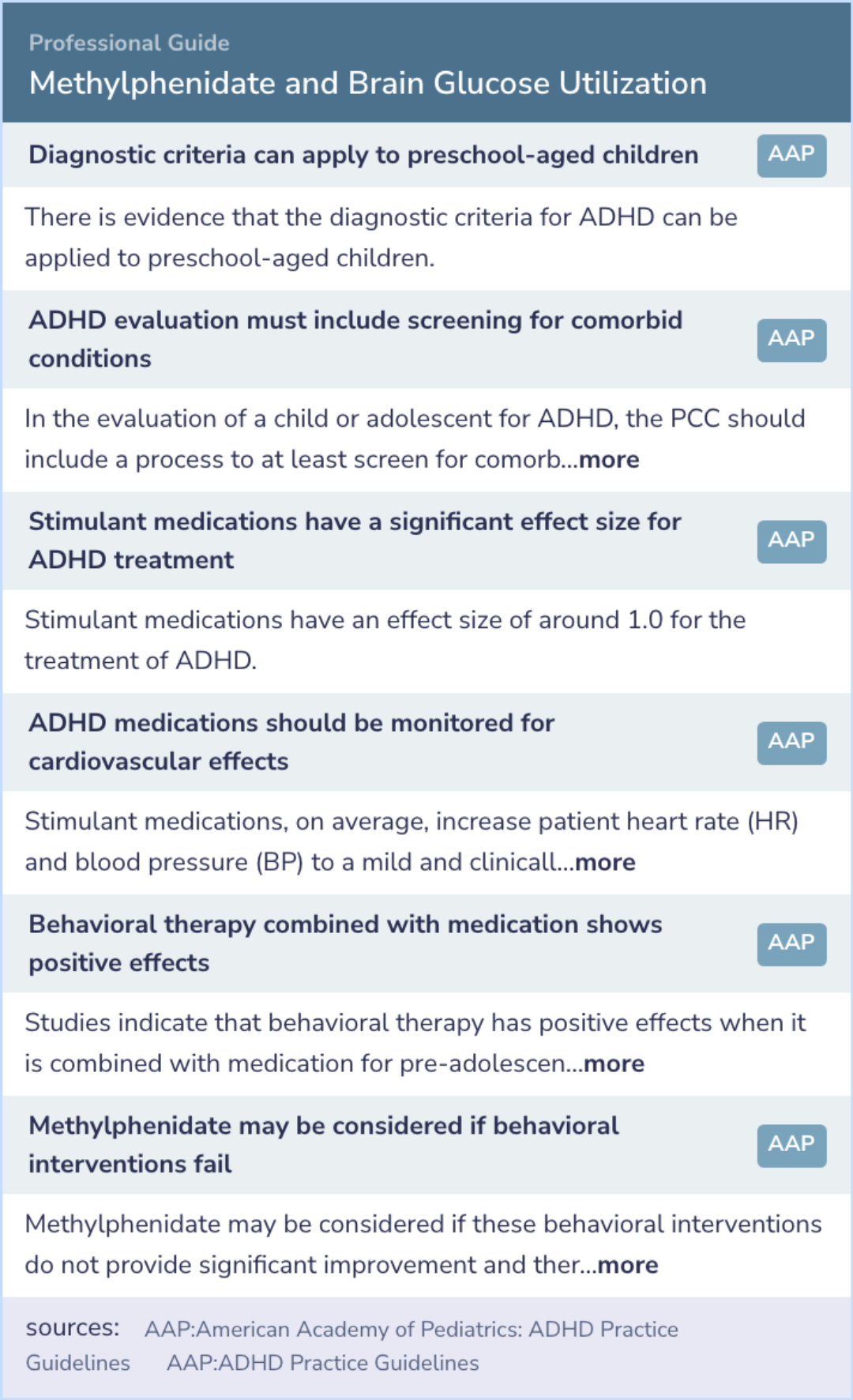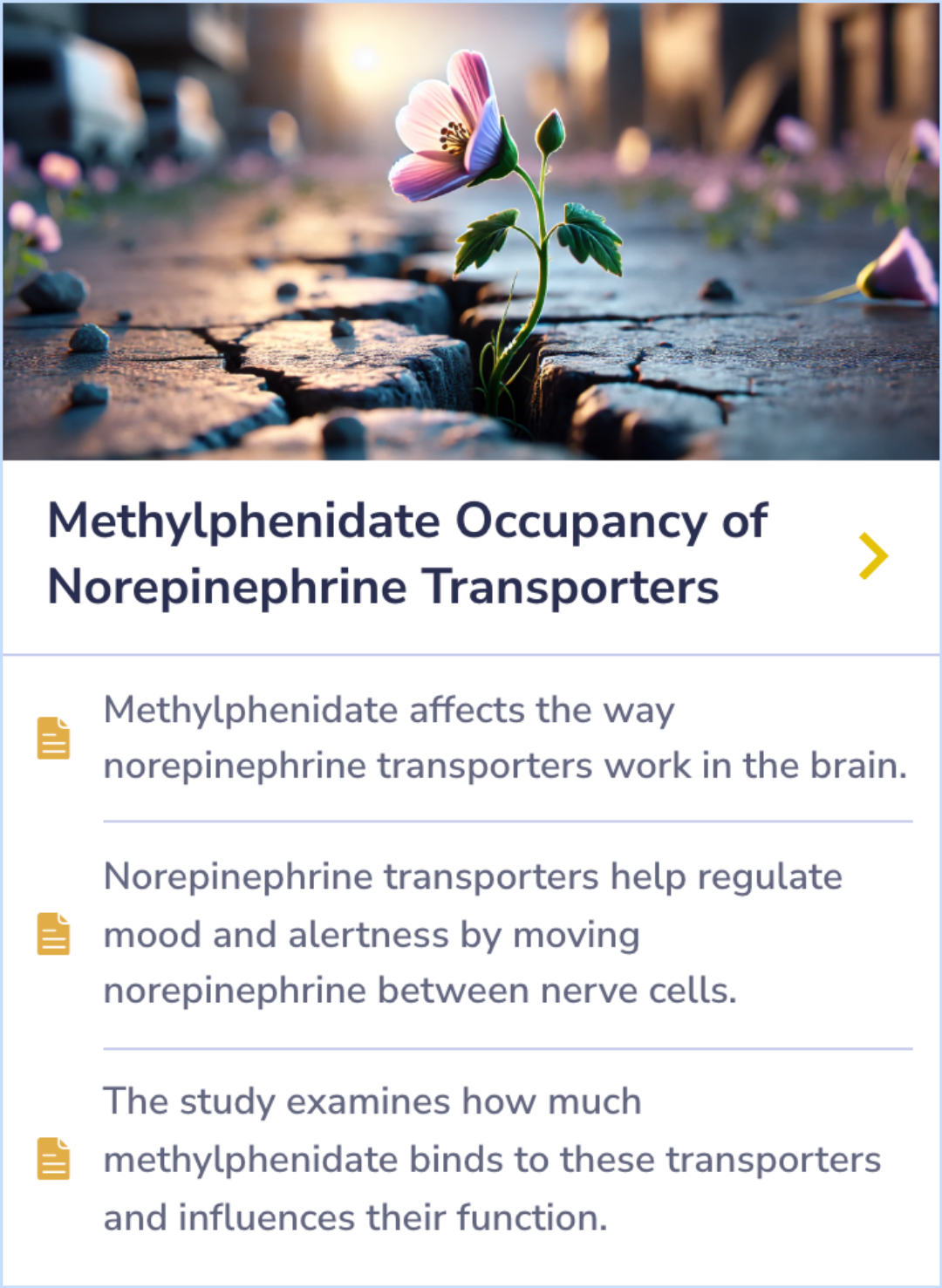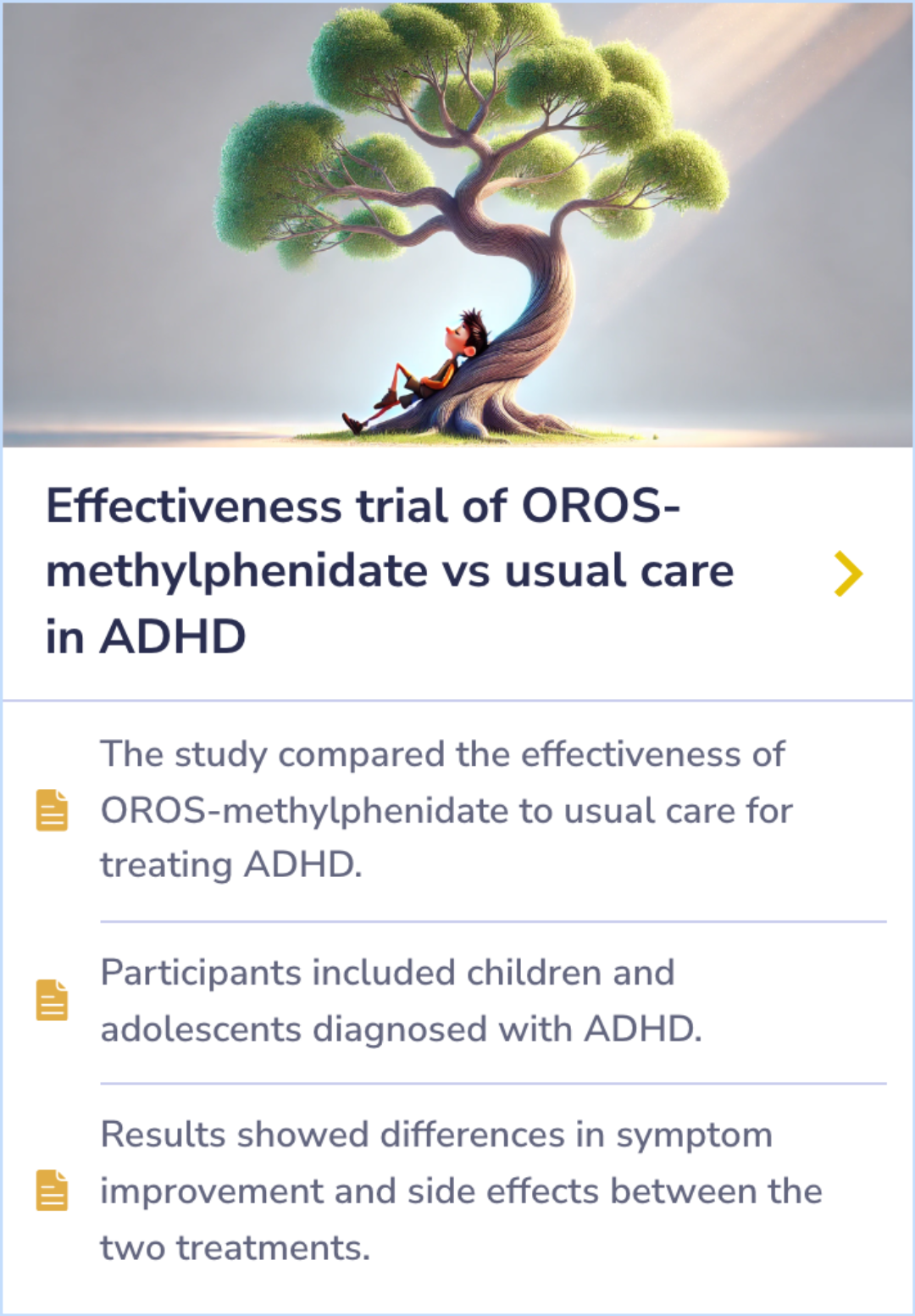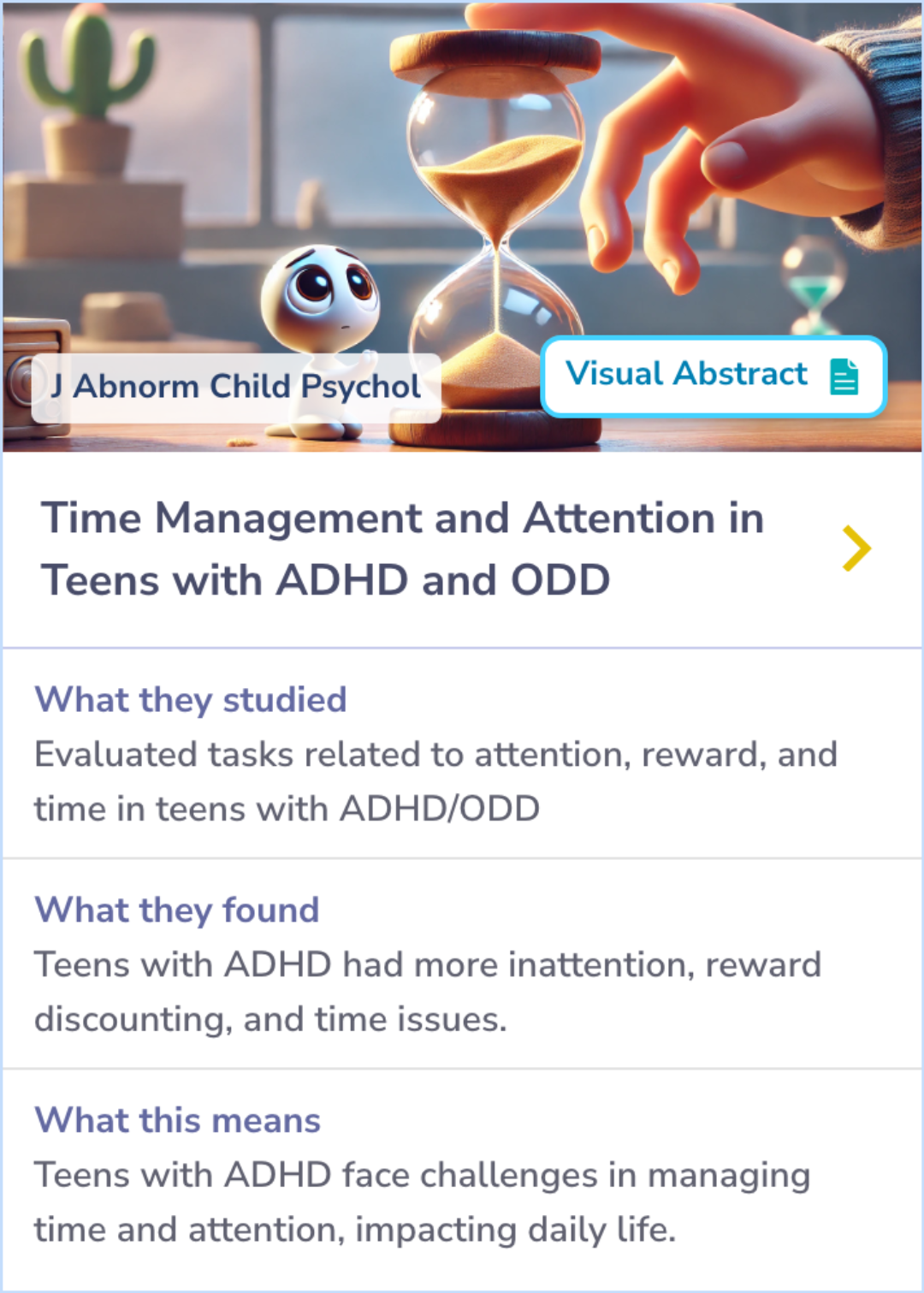Ritalin Paper Database
Visual Abstract
Methylphenidate decreased the amount of glucose needed by the brain to perform a cognitive task
Methylphenidate and Brain Glucose Utilization
October 18, 2024
author
Volkow ND, Fowler JS, Wang GJ, Telang F, Logan J, Wong C, Ma J, Pradhan K, Benveniste H, Swanson JM
journal
PLoS One
Date Published
2008 Apr 16
Why link to a visual abstract?
What is a visual abstract?
Original
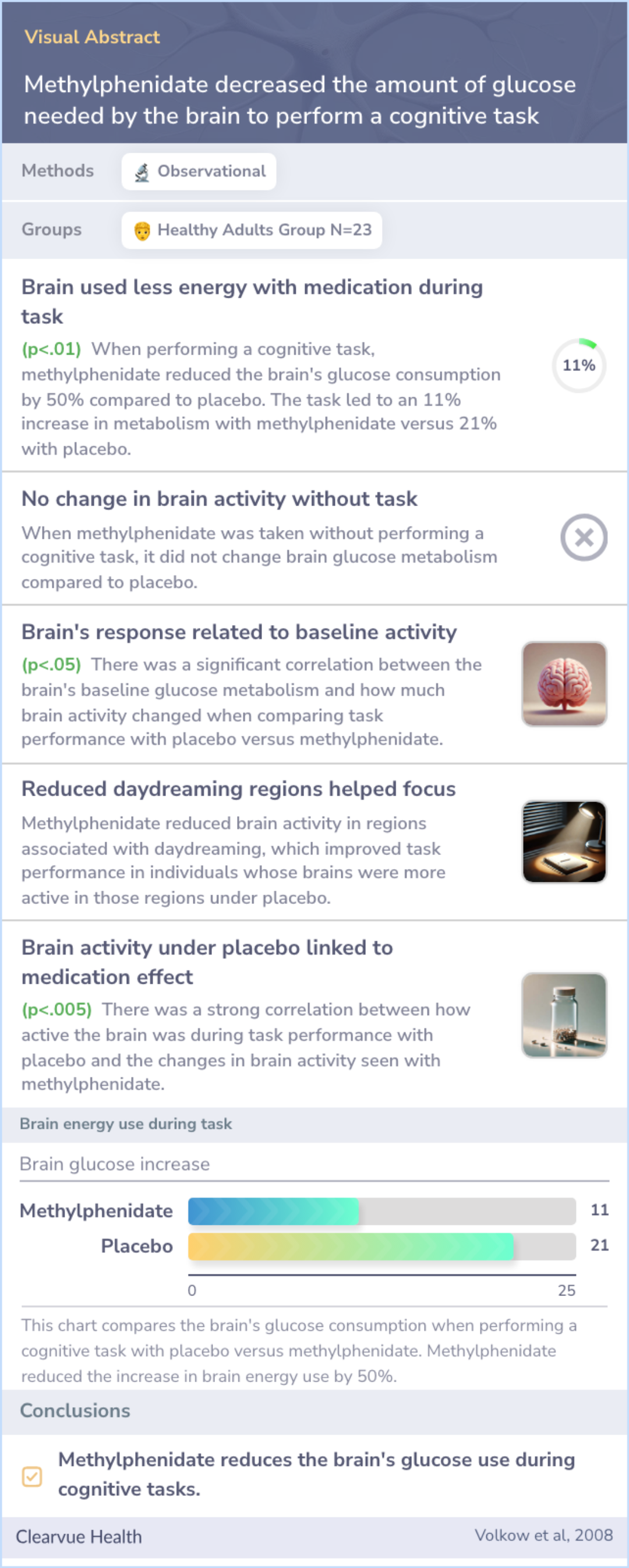
Study Summary
🔬
What They Studied
Researchers wanted to know how methylphenidate affects brain glucose use and cognitive performance.
💡
What They Found
They found that methylphenidate reduces the brain's glucose use during cognitive tasks.
📚
What This Means
These findings suggest that methylphenidate helps in focusing brain activity by making it more efficient. This supports the current understanding that it can improve focus in some people, especially those with ADHD.
Study Summary
Study Overview
Methylphenidate, a common medication for ADHD, was the focus of this study. Researchers wanted to understand how this drug affects the brain's activity during cognitive tasks. They explored whether methylphenidate makes the brain more efficient by reducing the regions activated during these tasks. The findings suggest that methylphenidate helps the brain focus its resources better, potentially improving cognitive performance for those who struggle with attention.
The drug's ability to decrease activation in the brain's default network, which is linked to mind-wandering, may explain why it helps some individuals perform better. However, the study also noted that the drug could impair performance in those whose brain activity is already well-regulated, highlighting the complex and varied effects of stimulants on cognitive function.
The drug's ability to decrease activation in the brain's default network, which is linked to mind-wandering, may explain why it helps some individuals perform better. However, the study also noted that the drug could impair performance in those whose brain activity is already well-regulated, highlighting the complex and varied effects of stimulants on cognitive function.
Abstract: background
The use of stimulants (methylphenidate and amphetamine) as cognitive enhancers by the general public is increasing and is controversial. It is still unclear how they work or why they improve performance in some individuals but impair it in others. To...more

Attenuation of Brain Metabolism
"This study documents that when MP was given with a cognitive task it markedly attenuated the brain metabolic increases induced by the task and reduced the regions activated by it."
Context-Dependent Effects
"The task dependency of MP effects is consistent with clinical findings documenting that the effects of stimulant medications are context dependent."
Default Network and Performance
"The ability of MP to decrease the activation in the default network and to decrease mind-wandering is one of the mechanisms that accounts for its beneficial effects in subjects in whom it improves performance."
Study Summary
Methods
The study measured brain glucose metabolism, which is an indicator of brain activity, in 23 healthy adults. This was done using a technique called Positron Emission Tomography (PET) along with a radioactive glucose compound. Participants were tested in two conditions: once at baseline and once while performing a cognitive task involving numerical calculations, both with and without taking 20 mg of methylphenidate orally.
Additionally, 16 of the participants underwent another scan where they took methylphenidate but did not perform any cognitive tasks. This helped to isolate the drug's effect on brain activity without cognitive stimulation.
Additionally, 16 of the participants underwent another scan where they took methylphenidate but did not perform any cognitive tasks. This helped to isolate the drug's effect on brain activity without cognitive stimulation.
Abstract: methods
We measured brain glucose metabolism (using Positron Emission Tomography and 2-deoxy-2[18F]fluoro-D-glucose) in 23 healthy adults who were tested at baseline and while performing an accuracy-controlled cognitive task (numerical calculations) given wi...more

Study Summary
Results
Participants on methylphenidate showed a 10% lower increase in brain activity during tasks compared to the placebo group. This indicates greater efficiency in brain resource use.The reduction in activation was most notable in regions linked to mind-wandering. Improved performance was only seen in those with increased activity in these areas during the placebo trial.
Abstract: results
Compared to placebo methylphenidate significantly reduced the amount of glucose utilized by the brain when performing the cognitive task but methylphenidate did not affect brain metabolism when given without cognitive stimulation. Whole brain metabol...more
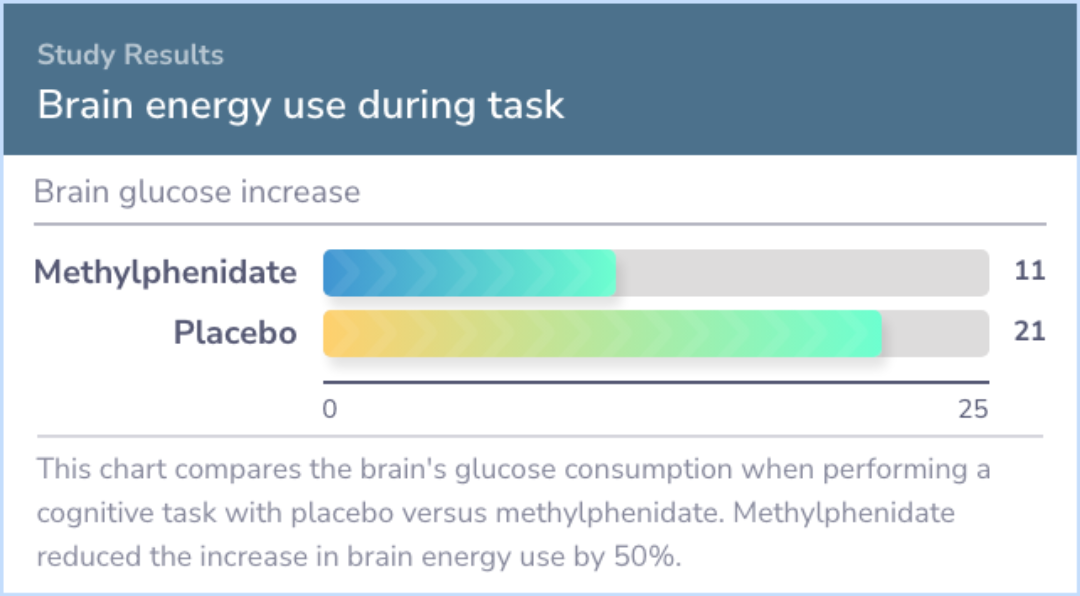
Study Summary
Conclusions
The results support previous findings that stimulants reduce brain activation's magnitude in response to tasks. They also show that these medications cause a more 'focused' brain activity. This effect can be helpful when the brain's resources are scattered (like during mind-wandering) or in cases of attention deficit hyperactivity disorder (ADHD).
However, this focusing effect could be harmful when the brain's activity is already well-tuned and focused. This dual nature may explain why methylphenidate is beneficial in some people or situations and harmful in others.
However, this focusing effect could be harmful when the brain's activity is already well-tuned and focused. This dual nature may explain why methylphenidate is beneficial in some people or situations and harmful in others.
Abstract: conclusions
These results corroborate prior findings that stimulant medications reduced the magnitude of regional activation to a task and in addition document a "focusing" of the activation. This effect may be beneficial when neuronal resources are diverted (i....more
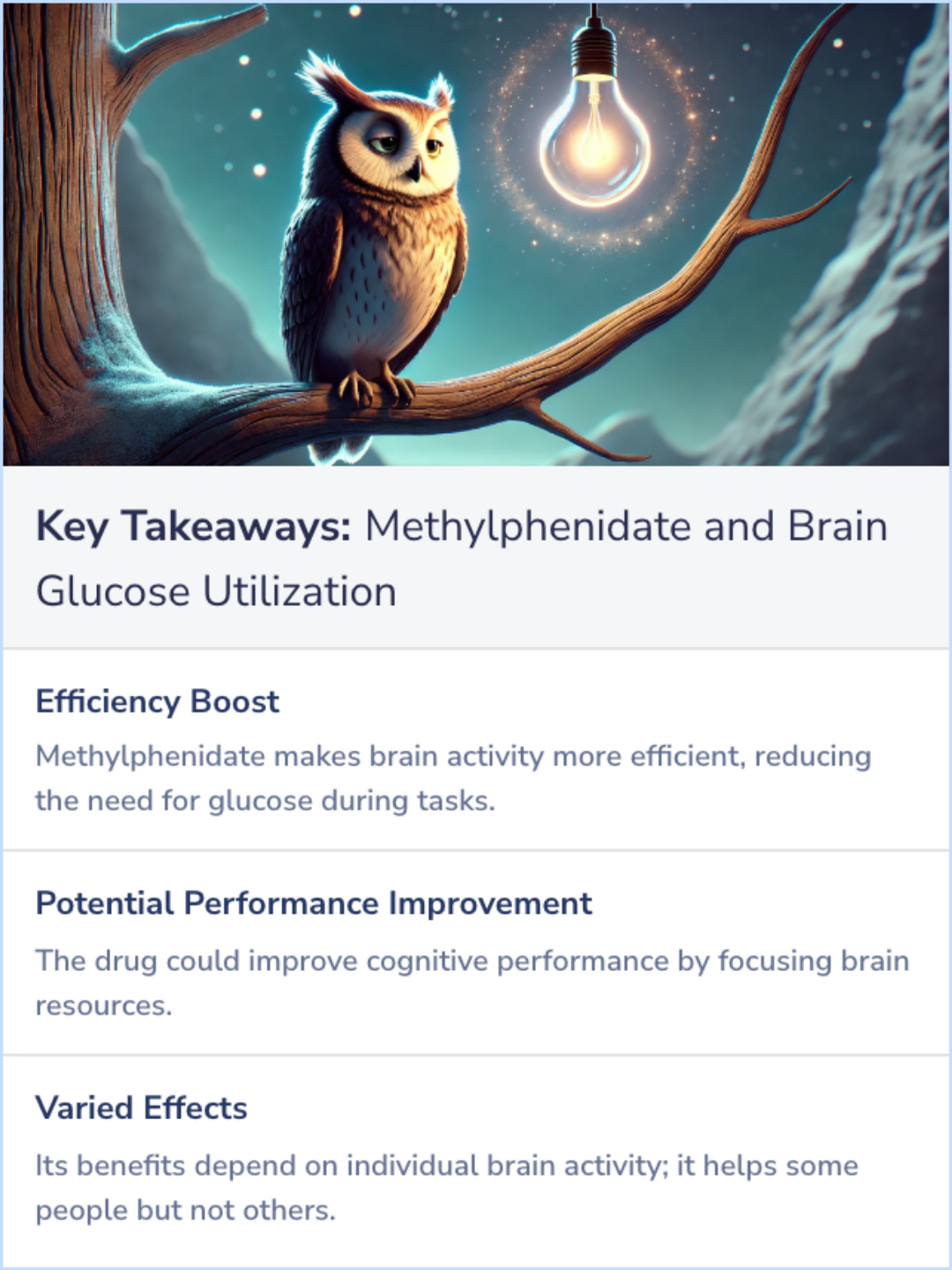
Background Information
Patient Guide
🧠
Mechanism of Action
Methylphenidate blocks the reuptake of norepinephrine and dopamine, increasing their concentration in the synaptic cleft.
🧬
Brain Glucose Utilization
Methylphenidate's role in cognitive enhancement linked to changes in brain glucose metabolism during cognitive tasks.
👨⚕️
Therapeutic Uses
Primarily used to treat ADHD and narcolepsy; also utilized off-label for cognitive enhancement and various other conditions.
💊
Formulations and Dosage
Available in varied formulations, including extended-release, transdermal patches, and chewable tablets, customized for patient needs.
🔬
Neuroprotection Elements
May offer neuroprotection by regulating dopamine levels, potentially beneficial in conditions like Parkinson's disease.
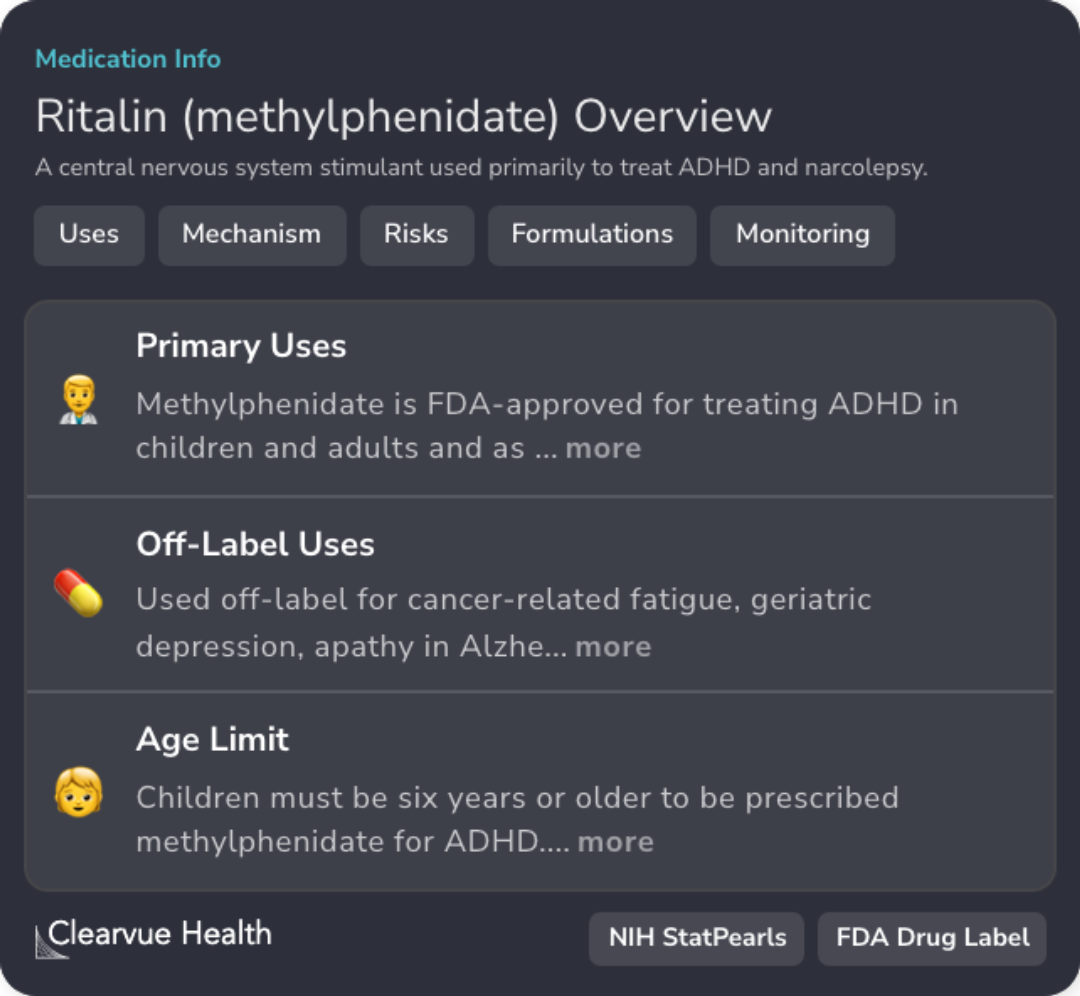
Professional Guide
Expert Opinion: Methylphenidate and Brain Glucose Utilization
In line with the study’s findings, professional guidelines underline the nuanced application of stimulant medications like methylphenidate in treating ADHD. Diagnostic criteria for ADHD can be applied to preschool-aged children, allowing early intervention.
Experts recommend screening for comorbid conditions during the evaluation process to address all aspects of a patient's health.
If behavioral interventions fall short, methylphenidate serves as a viable option for children aged four to five with significant functional disturbances.
The effect size of stimulant medications for ADHD treatment is notably substantial, reflecting their potential efficacy.
Monitoring cardiovascular effects is advised due to mild but potentially significant increases in heart rate and blood pressure.
Experts recommend screening for comorbid conditions during the evaluation process to address all aspects of a patient's health.
If behavioral interventions fall short, methylphenidate serves as a viable option for children aged four to five with significant functional disturbances.
The effect size of stimulant medications for ADHD treatment is notably substantial, reflecting their potential efficacy.
Monitoring cardiovascular effects is advised due to mild but potentially significant increases in heart rate and blood pressure.
Evidence Summary
Methylphenidate and Norepinephrine Transporters
Methylphenidate influences norepinephrine transporters in the brain, which play a key role in regulating mood and alertness by moving norepinephrine between nerve cells. The study looks at how this medication binds to these transporters and affects their function, shedding light on its impact on neurotransmitter movement.
This interaction highlights the complex ways methylphenidate modifies brain activity, which could explain its varying effects on mood and alertness in different individuals.
This interaction highlights the complex ways methylphenidate modifies brain activity, which could explain its varying effects on mood and alertness in different individuals.
Evidence Summary
Brain Efficiency with Methylphenidate
Understanding how medications like methylphenidate affect brain function can provide insight into their role in cognitive performance. This study showed that methylphenidate reduces brain glucose utilization during cognitive tasks, potentially increasing efficiency by enhancing the signal-to-noise ratio of neuronal activity.
Evidence Summary
ADHD Teens: Inattention, Temporal Discounting, and Time Reproduction
Clinic-referred teens with ADHD and ODD were assessed alongside community control teens on psychological tasks. Teens with ADHD showed more CPT Inattention but no differences in Working Memory or CPT Inhibition compared to controls. They also exhibited greater temporal discounting and impaired time reproduction, though not time estimation. These distinctions were consistent regardless of comorbid disorders like ODD or anxiety-depression, extending previous findings to adolescents.
